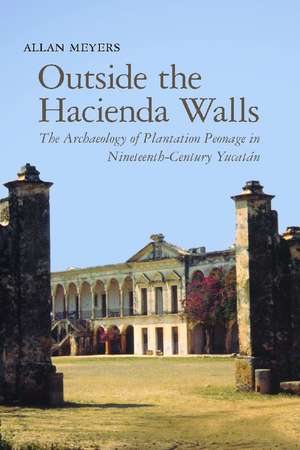Outside the Hacienda Walls: The Archaeology of Plantation Peonage in Nineteenth-Century Yucatán: Archaeology of Indigenous-Colonial Interactions in the Americas
Autor Allan Meyersen Limba Engleză Paperback – mar 2012
The Mexican Revolution was a tumultuous struggle for social and political reform that ousted an autocrat and paved the way for a new national constitution. The conflict, however, came late to Yucatán, where a network of elite families with largely European roots held the reins of government. This privileged group reaped spectacular wealth from haciendas, cash-crop plantations tended by debt-ridden servants of Maya descent. When a revolutionary army from central Mexico finally gained a foothold in Yucatán in 1915, the local custom of agrarian servitude met its demise.
Drawing on a dozen years of archaeological and historical investigation, Allan Meyers breaks new ground in the study of Yucatán haciendas. He explores a plantation village called San Juan Bautista Tabi, which once stood at the heart of a vast sugar estate. Occupied for only a few generations, the village was abandoned during the revolutionary upheaval. Its ruins now lie within a state-owned ecological reserve.
Through oral histories, archival records, and physical remains, Meyers examines various facets of the plantation landscape. He presents original data and fresh interpretations on settlement organization, social stratification, and spatial relationships. His systematic approach to "things underfoot," small everyday objects that are now buried in the tropical forest, offers views of the hacienda experience that are often missing in official written sources. In this way, he raises the voices of rural, mostly illiterate Maya speakers who toiled as laborers. What emerges is a portrait of hacienda social life that transcends depictions gleaned from historical methods alone.
Students, researchers, and travelers to Mexico will all find something of interest in Meyers's lively presentation. Readers will see the old haciendas—once forsaken but now experiencing a rebirth as tourist destinations—in a new light. These heritage sites not only testify to social conditions that prevailed before the Mexican Revolution, but also remind us that the human geography of modern Yucatán is as much a product of plantation times as it is of more ancient periods.
Drawing on a dozen years of archaeological and historical investigation, Allan Meyers breaks new ground in the study of Yucatán haciendas. He explores a plantation village called San Juan Bautista Tabi, which once stood at the heart of a vast sugar estate. Occupied for only a few generations, the village was abandoned during the revolutionary upheaval. Its ruins now lie within a state-owned ecological reserve.
Through oral histories, archival records, and physical remains, Meyers examines various facets of the plantation landscape. He presents original data and fresh interpretations on settlement organization, social stratification, and spatial relationships. His systematic approach to "things underfoot," small everyday objects that are now buried in the tropical forest, offers views of the hacienda experience that are often missing in official written sources. In this way, he raises the voices of rural, mostly illiterate Maya speakers who toiled as laborers. What emerges is a portrait of hacienda social life that transcends depictions gleaned from historical methods alone.
Students, researchers, and travelers to Mexico will all find something of interest in Meyers's lively presentation. Readers will see the old haciendas—once forsaken but now experiencing a rebirth as tourist destinations—in a new light. These heritage sites not only testify to social conditions that prevailed before the Mexican Revolution, but also remind us that the human geography of modern Yucatán is as much a product of plantation times as it is of more ancient periods.
Preț: 186.68 lei
Preț vechi: 266.91 lei
-30% Nou
Puncte Express: 280
Preț estimativ în valută:
35.72€ • 37.22$ • 29.58£
35.72€ • 37.22$ • 29.58£
Carte indisponibilă temporar
Doresc să fiu notificat când acest titlu va fi disponibil:
Se trimite...
Preluare comenzi: 021 569.72.76
Specificații
ISBN-13: 9780816529957
ISBN-10: 0816529957
Pagini: 248
Ilustrații: 61 illus, 13 tables
Dimensiuni: 152 x 229 x 10 mm
Greutate: 0.43 kg
Ediția:First Edition
Editura: University of Arizona Press
Colecția University of Arizona Press
Seria Archaeology of Indigenous-Colonial Interactions in the Americas
ISBN-10: 0816529957
Pagini: 248
Ilustrații: 61 illus, 13 tables
Dimensiuni: 152 x 229 x 10 mm
Greutate: 0.43 kg
Ediția:First Edition
Editura: University of Arizona Press
Colecția University of Arizona Press
Seria Archaeology of Indigenous-Colonial Interactions in the Americas
Notă biografică
Allan Meyers, PhD, is a professor of anthropology at Eckerd College in St. Petersburg, Florida, where he heads the college’s Latin American Study Center initiative. His work has appeared in scholarly journals and the magazines Archaeology and Expedition.
Recenzii
"Beautifully written."—The Americas
“Meyers' conclusions are solid and will be important for many years to come.”—Joel Palka, author of Unconquered Lacandon Maya: Ethnohistory and Archaeology of Indigenous Culture Change
“There aren’t many books like this. This is the future of archaeology—this kind of interdisciplinary approach that combines archival research, ethnographic interviews and on-the-ground archaeology.”—Jennifer Mathews, author of Lifeways in the Northern Maya Lowlands: New Approaches to Archaeology in the Yucatán Peninsula
“There aren’t many books like this. This is the future of archaeology—this kind of interdisciplinary approach that combines archival research, ethnographic interviews and on-the-ground archaeology.”—Jennifer Mathews, author of Lifeways in the Northern Maya Lowlands: New Approaches to Archaeology in the Yucatán Peninsula
"Destined to become an important work for scholars of Latin America and practitioners of historical archaeology for the foreseeable future."—Journal of Latin American and Caribbean Anthropology
“An excellent example of the power of interdisciplinary scholarship.”—Historical Geography
Descriere
Drawing on a dozen years of archaeological and historical investigation, Allan Meyers breaks new ground in the study of Yucatán haciendas. He presents original data and fresh interpretations on settlement organization, social stratification, and spatial relationships.














